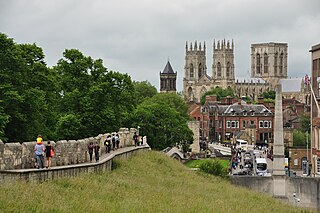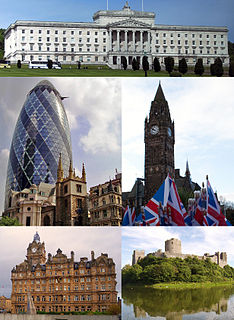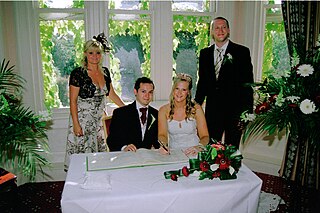
City status in the United Kingdom is granted by the monarch of the United Kingdom to a select group of communities. As of 26 January 2022, there are 70 cities in the United Kingdom—52 in England, 6 in Wales, 7 in Scotland, and 5 in Northern Ireland. Although it carries no special rights, the status of city can be a marker of prestige and confer local pride.

A listed building, or listed structure, is one that has been placed on one of the four statutory lists maintained by Historic England in England, Historic Environment Scotland in Scotland, Cadw in Wales, and the Northern Ireland Environment Agency in Northern Ireland.

The administrative geography of the United Kingdom is complex, multi-layered and non-uniform. The United Kingdom, a sovereign state to the northwest of continental Europe, consists of England, Northern Ireland, Scotland and Wales. For local government in the United Kingdom, England, Northern Ireland, Scotland and Wales each have their own system of administrative and geographic demarcation. Consequently, there is "no common stratum of administrative unit encompassing the United Kingdom".

Politics of England forms the major part of the wider politics of the United Kingdom, with England being more populous than all the other countries of the United Kingdom put together. As England is also by far the largest in terms of area and GDP, its relationship to the UK is somewhat different from that of Scotland, Wales or Northern Ireland. The English capital London is also the capital of the UK, and English is the dominant language of the UK. Dicey and Morris (p26) list the separate states in the British Islands. "England, Scotland, Northern Ireland, the Isle of Man, Jersey, Guernsey, Alderney, and Sark.... is a separate country in the sense of the conflict of laws, though not one of them is a State known to public international law." But this may be varied by statute.
Home Nations is a collective term with one of two meanings depending on context. Politically it means the nations of the constituent countries of the United Kingdom. In sport, if a sport is governed by a council representing the island of Ireland, such as the Irish Rugby Football Union (IRFU), the term can refer to the nations of the constituent countries on the island of Great Britain and the Irish nation.
GENUKI is a genealogy web portal, run as a charitable trust. It "provides a virtual reference library of genealogical information of particular relevance to the UK and Ireland". It gives access to a large collection of information, with the emphasis on primary sources, or means to access them, rather than on existing genealogical research.
Town and country planning in the United Kingdom is the part of English land law which concerns land use planning. Its goal is to ensure sustainable economic development and a better environment. Each country of the United Kingdom has its own planning system that is responsible for town and country planning, which outside of England is devolved to the Northern Ireland Assembly, the Scottish Parliament and the Senedd.

In the United Kingdom (UK), each of the electoral areas or divisions called constituencies elects one member to the House of Commons.
A county hall or shire hall is a common name given to a building that houses the seat of local government for a county.

The Parliament of the United Kingdom currently has 650 parliamentary constituencies across the constituent countries, each electing a single member of parliament (MP) to the House of Commons by the plurality voting system, ordinarily every five years. Voting last took place in all 650 of those constituencies at the United Kingdom general election on 12 December 2019.
The Fifth Periodic Review of Westminster constituencies was undertaken between 2000 and 2007 by the four boundary commissions for England, Scotland, Wales and Northern Ireland for the UK Parliament. The changes for England, Wales and Northern Ireland took effect at the 2010 United Kingdom general election; that for Scotland took effect at the 2005 election. All of the recommendations were approved.
Local government in the United Kingdom has origins that pre-date the United Kingdom itself, as each of the four countries of the United Kingdom has its own separate system. For an overview, see Administrative geography of the United Kingdom. For details, see:

The following outline is provided as an overview of and topical guide to the United Kingdom of Great Britain and Northern Ireland; a sovereign country in Europe, commonly known as the United Kingdom (UK), or Britain. Lying off the north-western coast of the European mainland, it includes the island of Great Britain—a term also applied loosely to refer to the whole country—the north-eastern part of the island of Ireland and many smaller islands.

The United Kingdom of Great Britain and Northern Ireland (UK), since 1922, comprises four constituent countries: England, Scotland, and Wales, as well as Northern Ireland. The UK Prime Minister's website has used the phrase "countries within a country" to describe the United Kingdom. Some statistical summaries, such as those for the twelve NUTS 1 regions of the United Kingdom, refer to Scotland, Wales, and Northern Ireland as "regions". With regard to Northern Ireland, Scotland and Wales particularly, the descriptive name one uses "can be controversial, with the choice often revealing one's political preferences".

The following outline is provided as an overview of and topical guide to England:

The architecture of the United Kingdom, or British architecture, consists of a combination of architectural styles, dating as far back to Roman architecture, to the present day 21st century contemporary. England has seen the most influential developments, though Ireland, Scotland, and Wales have each fostered unique styles and played leading roles in the international history of architecture. Although there are prehistoric and classical structures in the United Kingdom, British architectural history effectively begins with the first Anglo-Saxon Christian churches, built soon after Augustine of Canterbury arrived in Great Britain in 597. Norman architecture was built on a vast scale throughout Great Britain and Ireland from the 11th century onwards in the form of castles and churches to help impose Norman authority upon their dominions. English Gothic architecture, which flourished between 1180 until around 1520, was initially imported from France, but quickly developed its own unique qualities.

A civil, or registrar, ceremony is a non-religious legal marriage ceremony performed by a government official or functionary. In the United Kingdom, this person is typically called a registrar. In the United States, civil ceremonies may be performed by town, city, or county clerks, judges or justices of the peace, or others possessing the legal authority to support the marriage as the wedding officiant.